| open e-mail in browser • unsubscribe |

|
| EASP Bulletin | www.easp.eu @easpinfo |
EditorialDear Members, Colleagues and Friends, Summer is just around the corner, and the temperature is moving above zero also in the darkest corners of the north (aka Sweden). Thus, it’s time for a new issue of the Bulletin full of relevant news and updates on our key activities. As usual, there are a lot of interesting topics for our members. However, I want to draw your specific attention to two topics. First, we are very happy to say a big congratulation to Professor Naomi Ellemers, Utrecht University, who received the prestigious Aristotle award from the European Federation of Psychologists Associations this year! Moreover, there are some particularly important news in the Presidential Corner in this issue. We have before us some quite dramatic changes for our association, partly because of the changing landscape with regard to publication practices, and partly due to changing tax laws in the EU. I strongly recommend you to thoroughly take part of the Presidential Corner, where you can learn more about what is going on, how our organisation will be affected, and how you can contribute to shaping the EASP in the future. We wish you all a great spring and summer season. On behalf of the Executive Committee Times they are a changin’President's CornerDear Members, The political and economic implications of Brexit are broadly and extensively covered by the media. But what about the implications for science? First and foremost, cooperation between the UK and continental European researchers will become more difficult, for example if the UK will not participate in the European funding programs anymore. But Brexit has also implications for the EASP as an organisation. Most of the EASP’s income is paid to us by Wiley in British Pounds – which has decreased in value since the Brexit vote. In other words, the EASP’s budget has been suffering from the Brexit vote – so far not substantially, nor to a harmful extent, but we need to closely monitor the developments. Unfortunately, this is not the only threat to association’s budget: The coalition-s has increased the speed in the change towards Open Access publishing in Europe. As such, the trend towards Open Access is definitely desirable - knowledge generated with public funding should be freely accessible for everyone. However, the current changes also have a downside. The trend towards Open Access publishing means that the current publication model will soon vanish, and with it the income which most scientific associations gain through journal publication. Many journals are (co-)owned by scientific associations and these associations – including the EASP – profit from the current subscription model. The trend towards Open Access leads to new arrangements between publishers and library consortia like the recent agreement between Wiley and the German consortium DEAL. DEAL managed to negotiate a lower price (almost 50 % less) for journal access. Ideally, this might create degrees of freedom in the university budgets, in a less ideal case the saved funds remain at a federal level and will not lead to more financial breathing space at universities. What is often overlooked in this context is the party that is earning less under these new deals: Scientific societies. In the case of the EASP, the reduced costs for journal access mean that we will very soon have less money for travel grants, seedcorn grants, small group meetings, and summer schools. We may have to increase the fees for the GM, too. In sum, there are definitely reasons to be happy about Open Access arrangements, but it will most likely soon lead to less resources for the support of (junior) researchers and may require compensation out of budgets that may or may not benefit from these changes. In the end, it is a zero-sum game and it is questionable if the funds freed at one end of the academic world will actually be made available to those who need it (for more information about this issue, see "Open Access - what scientists need to know now" by Kai J. Jonas). A final development that many of you might have recognised in your local institutions also hit the EASP. Universities and scientific associations have long been treated more liberal than businesses by tax authorities. However, this now changes step by step, and it seems that the EASP will very likely also be affected by this change. So far, we have managed not to pay taxes because we spent our income for charitable purposes. However, at the same time we are engaging in business activities by virtue of our journal co-ownership and royalty contracts with the publishers. Given current changes in tax regulations, the EASP might be requested to pay taxes already from this year onwards. We are working with tax advisors to secure the best possible solution and to reduce taxable income to a minimum. Taken together, the EASP is facing small, but altogether substantial threats to her budget and we cannot discount them any longer. Due to all these unfavorable changes in the societal context, the EASP in its current form might not survive too long, if we do not initiate a substantial change. Thus, the Executive Committee of the EASP has concluded that the EASP needs to develop a vision that will allow us to keep the association in good shape and to survive the current changes without giving up our activities in support of social psychology in Europe – and in particular not the activities in support of early career researchers and those leading to more diversity of European social psychology. As a consequence, the EC decided has to implement a number of steps to secure its future and to maintain the capacity to act. As a first step, we have decided to implement a means to warrant continuity: the introduction of a new role, namely that of a President-Elect. Up to now, the EASP has elected the president on the day the presidency started (i.e., after the business meeting at each GM). In contrast, most other scientific associations have a president-elect that becomes a member of the board one term before the presidency starts. This procedure allows for continuity and long-term strategies, and will from now on also be applied by the EASP. For this reason, the members of the EC who will serve another three years after the 2020 General Meeting in Krakow, have jointly decided which one of them will serve as the EASP’s next president (for details see “Next EASP Presidency”, below). For the second major step towards the EASP’s future, the Executive Committee of the EASP will hold a Vision Workshop in October. A selection of members from different career stages will be invited based on self-nomination. The aim of this workshop is to develop ideas regarding what functions the EASP should have for the scientific community within our field for the next decade or two. The EASP was initially founded to provide a platform for the upcoming discipline of social psychology in Europe in the 1960’s. Nowadays, social psychology is a well-established discipline in most European countries. The discipline, and with it our association, have to deal with different challenges – those mentioned above, but also a number of other pertinent issues. We are still in the aftermath of the replication crises; we need to create and explain the societal relevance of our discipline, and last but not least we need to secure a place for European social psychology in a global scientific area. These and other aspects at the current stage of our discipline and the societal context in which we conduct research should be considered in the Vision Workshop. We invite your contribution as participant or in the form of a written statement (see below for the call). With this workshop we would like to give you and all members of the association a strong voice in the change process. Our standing orders do not really define such processes of reflection, yet, we (the EC) believe that it is timely to engage with members on this matter and to not only leave this for a discussion amongst the EC. We will provide feedback of the workshop results and present an outline of the future path during the General Meeting in Krakow next year. Kind regards, Call for participation: EASP’s Vision Workshop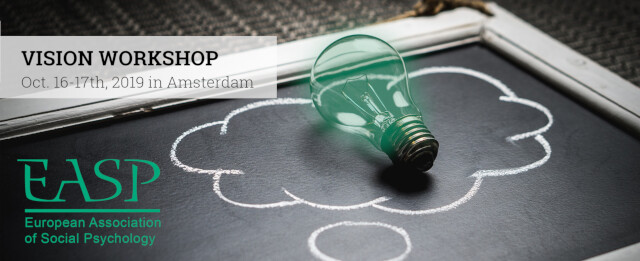 The EASP will hold a vision workshop in Amsterdam from October 16th, 2019, 2pm until October 17th, noon. During the workshop, we aim to develop the corner stones of the vision that will guide the EASP for the next decade and beyond, regarding:
We invite members at all stages of their scientific career, from advanced graduate students to senior scientists, to participate. In particular, members who could envision to run for the next election of the Executive committee (EC) are welcome. We will select participants based on the EASP’s diversity policies to make sure that the breadth of our membership is being reflected. Travel and accommodation expenses for the participants will be covered by the association. Please indicate your interest via email to Sibylle Classen (sibylle@easp.eu) before June 1st, 2019. Please include a motivation statement (max. 500 words) and provide information about your gender, age, nationality, year of highest degree, international experience, and current position (e.g., in a short CV). Please also indicate in a short separate statement, if you are interested in becoming an EC member and with which goals. We also welcome written contributions to the workshop from those who are willing to share their ideas about the associations future, but will not be able to participate in the workshop. Please send these ideas before September 1st, 2019 to Kai Sassenberg (k.sassenberg@iwm-tuebingen.de). Open Access – what scientists need to know nowKai J. JonasThe increasing prevalence of open access deals between national consortia, library networks, and universities on the one hand, and journals on the other hand has a number of consequences that scientists need to take into account. The world of scientific publishing is changing dramatically these days. This is an extremely fluid context at the moment, with many changes occurring, problems vanishing and novel ones coming up. Scientists need to familiarise themselves with Open Access options: Gold open access denotes an OA version where an author publishes their article in an online open access journal. In contrast, green open access denotes a format where an author publishes their article in any journal and then self-archives a copy in a freely accessible institutional or specialist online archive known as a repository, or on a website. Libraries at many institutions can explain those models and guide authors to the proper repository options. Next to those fundamental aspects, the EASP wants to give you an overview of benefits, but also issues that scientists may currently encounter. 1) Funder demands 2) Publication planning 3) Multinational collaboration networks In sum, OA offers a number of great opportunities, especially in the context of making research findings available to a broad audience, but is requires (at least at the moment) some careful planning in terms of budget, journal selection and authorship planning. Next EASP Presidency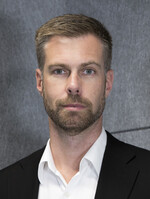
Kai Jonas We are pleased to announce that after a
productive discussion we agreed to elect Kai Jonas as the
next President of the EASP. We are fully convinced that Kai is capable to
guide the EASP through a period of challenges that the Association is
facing. We all know that the academic world is transforming faster than
ever. The demands of our members are also changing. The EASP needs to
change too. It needs to be more diverse, inclusive and more engaged in
politically charged scientific contexts. It also needs to be more
innovative and contribute to solving current pressing global issues.
Finally, the EASP needs to put forward future legal formats, new forms of
financing and incomes, and administration to be able to stay active. In
other words, the EASP needs to become more professional, in terms of
procedures, transparency, and activities. Kai, with his strong academic
background in social psychology, ample experience in academic
administration, and familiarity with current publishing policies is the
perfect match for EASP leadership for the presidency of 2020-2023.
Update on EASP GM in KrakowKatarzyna Jasko (EASP GM Organiser)The next General Meeting of the EASP (2020) will take place in Krakow at the Jagiellonian University. Those of you who hoped to give their presentations in the Copernicus’ Room at Collegium Maius might be disappointed to hear that the meeting will be hosted at the most recently opened university venue – Auditorium Maximum. Nobody should worry though because discussions about the advancement of social psychology will be accompanied by the historical spirit present at both the opening reception and the conference dinner. On the first day of the conference you will be able to (re)connect with other participants in the gardens of the Archaeological Museum with an amazing* view of the Wawel castle. On the final day you can explore the jewels of the Jewish quarter, where the conference dinner will take place. Those who still cannot forget about the Copernicus’ Room, we hear you! The guided tours will be offered during the conference, so nobody will miss on anything. Details on how to become a part of this event and submit symposia, blitz sessions, and posters will follow soon. Stay tuned! * Hopefully, it will not be a rainy view. Anyone who is doing research on optimism, magical thinking, and the effectiveness of rituals – We are counting on you! Update on the Situation of Academics in TurkeyHere is a short update on Demet Islambay's court hearing, which was on March 7th, 2019, as well as the case of Professor Füsün Üstel. It was Demet’s first trial. She had planned on making a statement of defence, but the court sent her case to Ankara (the city where the "crime" was committed) without considering her defence request. Currently, we do not know the courts will accept the case, nor do we have information on the next hearing date - just that the process has been prolonged. Professor Füsün Üstel’s case went for appeal and her sentence was upheld. She will be starting a prison sentence of 15 months within the next 2 months. Since the begin of hearings, academics have started receiving longer and longer sentences (some up to 36 months). Sentences over 24 months cannot be suspended, meaning that many others are likely to start serving their prison sentences. We would appreciate it if you could support and/or share the following links:
Yasemin (on behalf of SPPPT) Claude Flament (1930-2019), a Tireless Discoverer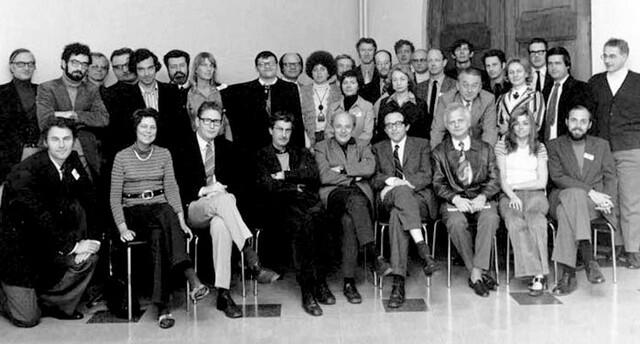
Claude Flament sitting to left of Henri Tajfel (from left, first row, 4th position) at the 1972 GM in Leuven Talking about Claude Flament is an extremely difficult task because of the density that predominates regarding his career and his work. A career that began in Paul Fraisse’s Laboratory of Experimental and Comparative Psychology in the early 1950s. Claude Flament developed a very marked experimental orientation and an outright taste for experimental social psychology and theoretical and statistical modelling. He then went to Aix-en-Provence where he founded, in 1967, the laboratory of social psychology of which he will be the head until 1983. He supervised the Ph.D. dissertations carried out by Jean-Paul Codol and Jean-Claude Abric and the Michel-Louis Rouquette’s “Thèse d’Etat”. He was founding member of the European Association of Experimental Social Psychology, of which he was president from 1972 to 1975. Claude Flament has been one of those pioneers of European Social Psychology alongside illustrious names in our discipline such as S. Moscovici, H. Tajfel, J.M. Nuttin, W. Doise, M. Mulder or G. Jahoda. He will be a great influence regarding the use of mathematical models, which was the topic of his talk at the first EAESP Conference in Sorrento in 1963. He will organise the 5th meeting of the Association in Aix-en-Provence in 1967. His career in Aix-en-Provence (1961-2015) will be profoundly marked by his investment in what is called the central core theory. He will create and develop the structural approach of social representations with Jean-Claude Abric. A research career punctuated by methodological and theoretical innovations, founding texts, all in a constant and assumed concern of the study of the social fact. Claude Flament worked social phenomena with a sharpness and a hindsight that never left one indifferent. His interventions were all an opportunity for learning, which despite their sometimes brief and succinct nature, enabled his audience to nourish weeks and months of reflection. Claude Flament was an innovative researcher, a tireless discoverer, he has always wanted to expand and grow research. Passionate about the Boole algebra, which he will adapt to the analysis of the questionnaires, he was a pioneer in the development of the graph theory and the creator of the similarity analysis that will be the first major methodological progress of the structural theory of social representations. But Claude Flament was also a colleague and a totally approachable Research supervisor who did not count the hours he gave to the spread of knowledge. His investment in the doctoral training has marked a whole generation of young researchers through a seminar dedicated to them and that he conducted with his rigor, his benevolence and his malicious intelligence. Seeing young researchers working on their statistical software, he often reminded them that he himself carried out these analyses by hand when he was a young researcher, these factorial analyses on which he invested so much. Claude Flament fully mastered data analyses, he knew all the subtleties and was a gold mine of knowledge he never hesitated to share. By his knowledge of social psychology, by his intuitions, by his intelligence of research, he was an example, a model for doctoral students whose work he was supervising. He was not always able to show the affection he had for them, but those who continued to work with him long after defending their Ph.D know that this affection was very real. Claude Flament, a researcher constantly concerned about the social fact - and his work on the Guttman effect in ACP is the perfect illustration - was a man of conviction, openness, great culture, who never untied theory and method, an indispensable concern that is too often ignored nowadays. He will remain a model of experimental rigor, theoretical reflection and a model of transmission and innovation. We had the immense privilege of being with him, learning by his side and reflecting with him. It is a mainstay of social psychology that leaves us and that will have forever marked our discipline. C. Guimelli, P. Moliner, P. Rateau, G. Lo Monaco Claude Flament (1930-2019)Obituary EFPA Aristotle Prize 2019 awarded to Prof. Dr. Naomi Ellemers, University Utrecht (Netherlands)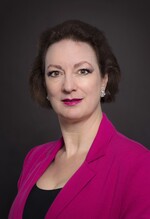
Naomi Ellemers The Aristotle Prize was given to EFPA by
the President of the 4th European Congress of Psychology in 1995 Athens,
Greece, to be awarded to a psychologist or group of psychologists from
Europe who has/have made a distinguished contribution to psychology. On
behalf of the Aristotle Prize Selection Committee, the chair Prof. Telmo
Baptista stated the following:
Therefore, the Selection Committee decided to elect Professor Ellemers as the recipient of the Aristotle Prize 2019. The award will be handed over to Professor Ellemers during the Opening Ceremony of the European Congress of Psychology in Moscow on Tuesday, July 2, 2019, and at this congress she will also give her key talk. Call for Suggestions for Tajfel and Codol Awards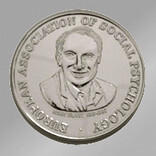 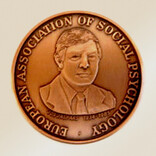 The Tajfel and Codol awards will be selected by
the Executive Committee in October 2019. The awards will be handed over at
the General Meeting in Krakow 2020.
The Henri Tajfel award recognises a distinguished lifetime contribution by a full member of EASP. The Jean-Paul Codol award recognises outstanding service to the Association or Social Psychology in Europe more generally. Please see our website for more details on the awards. Although there is no open call for applications for these awards, the EC encourages suggestions from EASP members. Please take some time to consider your suggestions and contact the President of EASP at k.sassenberg@iwm-tuebingen.de to make your views heard, with the name and a brief justification for your suggestion. All suggestions will be shared with, and considered by, the EC. Deadline for suggestions is September 15, 2019. Upcoming MeetingsA reminder of upcoming meetings, summer schools and events organised or sponsored by the EASP. EASP Meeting: Annecy Interpersonal Relationships and TechMay 24-25th, 2019, Annecy, France Application deadline: March 10th, 2019 EASP Meeting: Language Challenges in the 21st CenturyJune 20th-22nd, 2019, University of Warsaw, Poland; Application deadline: January 31st, 2019 RKTS Workshop: Building An LGBT European Social PsychologyJune 21st-22nd, 2019, ISCTE-UEL; ISCTE-Lisbon University Institute, Portugal; Extended application deadline: May 1st, 2019 EASP Meeting: Intergroup CommunicationJune 26-28th, 2019, University of Bologna, Italy Submission deadline: January 31st, 2019 Joint EASP-SPSSI Meeting: Self-affirmation in Education: Why, when, and how are self-affirmation interventions effective at reducing educational inequalities?June 27-28th, 2019 at University of Sussex, UK; Application deadline: December 15th, 2018 EASP Meeting: The Evolution, Emergence, Development, and Maintenance of StereotypesJune 27-30th, 2019, Eyba/Saalfeld, Germany Extended application deadline: March 10th, 2019 EASP Meeting: Cognitive Conflicts: Taking a Cognitive Perspective on Social PhenomenaJuly 3rd-6th, 2019 at the Max Planck House in Tübingen, Germany; Application deadline: January 20th, 2019 EASP Meeting: Defeating the Seven-Headed Dragon: An Exploration into the Complex Self-Maintaining System that Causes Gender InequalitySeptember 26-28th, 2019, Utrecht, Netherlands Application deadline: March 1st, 2019 EASP Summer School in 2020... and in 2021News of Upcoming Locations Member Publications and AnnouncementsNew Publication: Agency and Communion in Social PsychologyEdited by Andrea Abele and Bogdan Wojciszke; Routledge, 2018; ISBN: 978-1-138-57027-6 Conference: Forces and Forms of Doctoral EducationSeptember 5–6th, 2019, Herrenhausen Castle, Hannover, Germany; Registration opens March 2019 Antti Eskola (1934–2018)Obituary by Klaus Helkama Amélie Mummendey (1944-2018)Obituary Changes in the Author Guidelines for EJSPEffective from February 1st, 2019 8th GESIS Summer School in Survey MethodologyAugust 1st-23rd, 2019 in Cologne, Germany Registration now open! 3rd International Winter School: The Method of ImaginationDecember 2-5, 2019, University of Sydney Registration deadline: October 30th, 2019 New Publication: Serge Moscovici: Psychologie des représentations socialesby Nikos Kalampalikis (Ed.); Paris, EAC, 2019 ISBN: 9782813003300 ISRE Preconference: Cultural Shaping of EmotionJuly 10th, 2019 in Amsterdam, The Netherlands Submission deadline: May 10th, 2019 Call for Papers to a Special Issue of GPIR, 'Rethinking the group: Group Processes in the Digital Age'Submisson deadline: September 15th, 2019 Call for papers: 21st ESCON Transfer of Knowledge Conference2-4th September, 2019; University of Bordeaux Sumission deadline: June 15th, 2019 Call for Papers: CRSP Special Issue on Psychological Processes and Applications of NudgingSubmission deadline: May 31st, 2019 Grant and Meeting ReportsTravel Grant Report by Frederik WermserUniversity of Groningen, Netherlands; Research visit at the University of Queensland in Brisbane, Australia Report on EASP Meeting: Introducing Structure: Networks in Social PsychologyOctober 31st-November 3rd, 2018 in Brussels, Belgium; Organisers: Julia Eberlen & Olivier Klein Travel Grant Report by Ruddy FaureVrije Universiteit Amsterdam, Netherlands; Visit at Florida State University Preliminary Seedcorn Grant Report by Branković, Essien, Goh, Goudeau, Lantos, Reimer and VeldmanProject: "The Hypocrisy of High Status: Does the Acceptability of Collective Actions Lie in the Eye of the Beholder?" (December 2018) Seedcorn Grant Report by Simon SchindlerUniversity of Kassel, Germany; Project: Potential Negative Consequences of Mindfulness in the Moral Domain Seedcorn Grant Report by Kristina PetkovaBulgarian Academy of Sciences, Bulgaria; Project: The Challenged Identity. Struggles around the Council of Europe Convention Report on EASP Meeting: Polarization, Populism, Political Alienation: Causes and Consequences of Social Diversity and Inequality?Consultation and Discussion Seminar with a Focus on PhD Students and Postdocs: 1st-4th November, 2018, Landau, Germany Seedcorn Grant Report by Bastiaan RutjensUniversity of Amsterdam, Netherlands; Project relating to the heterogeneous nature of belief in science and science skepticism Pre-Registered Grant Report by Karolina Urbanska et al.Karolina Urbanska (Université Clermont Auvergne), Shelley McKeown-Jones (University of Bristol), and Laura Taylor (Queen’s University Belfast) Travel Grant Report by Laurent LicataUniversité libre de Bruxelles, Belgium; Research visit to Universidad Mayor and COES Travel Grant Report by Matthias S. GobelBrunel University London, UK; Research visit to the Kokoro Research Center in Japan Seedcorn Grant Report by Schumann, Ehrke and DupontSandy Schumann, University College London; Franziska Ehrke, University Koblenz-Landau; and Julia Dupont, University Koblenz-Landau Travel Grant Report by Soraya Elizabeth ShamlooUniversity of Trieste, Italy; Research visit to Dr. Mauro Bianchi, Lusófona University, and ISCTE-IUL, Portugal Travel Grant Report by Silvia MariUniversity of Milano-Bicocca; Research visit to the Stephen M. Ross School of Business at the University of Michigan, Ann Arbor, USA Seedcorn Grant Report by Marie Hennecke and Maike LuhmannUniversity of Zürich, Switzerland; Project: “Beliefs about the malleability of life satisfaction and their effects” Travel Grant Report by Sébastien GoudeauUniversité Paris Descartes; Research visit to Professor Hazel Rose Markus at Stanford University Seedcorn Grant Report by Lukas Wolf and Paul HanelUniversity of Bath, UK; Project: The Persuasiveness of Value-Based Arguments in a Brexit Context Preliminary Seedcorn Grant Report by Cristina BaldissarriUniversity of Milano-Bicocca; Project about the possible consequences of working self-objectification Travel Grant Report by Teri KirbyUniversity of Exeter; Visit to New York University New Members of the AssociationThe following applications for membership were approved by the Executive Committee in April 2019. Each applicant will become a member of the EASP in the category indicated below. Names of members providing letters of support are in the third line of each entry:
Grant AwardsThe following members have received a grant from the EASP:
Executive CommitteeJean-Claude
Croizet (Meetings Officer), j-claude.croizet@uca.fr Ernestine Gordijn
(Journals Officer), e.h.gordijn@rug.nl Kai Jonas
(Treasurer), kai.jonas@maastrichtuniversity.nl Małgorzata
Kossowska (European Liaison Officer), malgorzata.kossowska@uj.edu.pl Torun Lindholm
(Secretary), tlm@psychology.su.se Monica Rubini
(Grants Officer), monica.rubini@unibo.it Kai Sassenberg
(President), k.sassenberg@iwm-tuebingen.de Sibylle Classen
(Executive Officer), sibylle@easp.eu
|
|||||||||||||||||||||||||||||||||||||||||||||||||||||||||||||||||||||||||||||||||||||||
|
Executive Officer |
Secretary |
Media Manager |
|
You are receiving this message because you are subscribed
to the EASP Bulletin mailing list. If you no longer wish to receive this mailing please click here to unsubscribe. Please do not forward this email without removing this paragraph, as otherwise your recipient(s) may inadvertently unsubscribe you from the mailing list. |